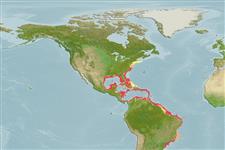>
Eupercaria/misc (Various families in series Eupercaria) >
Lutjanidae (Snappers) > Lutjaninae
Etymology: Lutjanus: Malay, ikan lutjan, name of a fish.
More on author: Cuvier.
Environment: milieu / climate zone / depth range / distribution range
Οικολογία
Θαλασσινό(ά); Υφάλμυρο Υφαλόφιλο(α); εύρος βάθους 25 - 95 m (Ref. 9626), usually 40 - 70 m (Ref. 9626). Tropical; 20°C - 28°C; 42°N - 28°S, 98°W - 31°W (Ref. 55226)
Western Atlantic: Massachusetts, USA and Bermuda (Anderson, pers. comm.) to southeastern Brazil, including the Caribbean Sea and the Gulf of Mexico (Ref. 9626). Most abundant around the Antilles, the Bahamas and off southern Florida.
Length at first maturity / Μέγεθος / Βάρος / Age
Maturity: Lm 43.8, range 28 - 40 cm
Max length : 94.0 cm TL αρσενικό/απροσδιόριστο; (Ref. 40637); common length : 50.0 cm TL αρσενικό/απροσδιόριστο; (Ref. 55); μεγ. δημοσιευμένο βάρος: 15.6 kg (Ref. 26340); μεγ. αναφερόμενη ηλικία: 29 έτη (Ref. 46200)
Ραχιαίες άκανθες (συνολικά) : 10 - 11; Μαλακές ραχιαίες ακτίνες (συνολικά) : 13 - 14; Εδρικές άκανθες: 3; Μαλακές εδρικές ακτίνες: 7 - 8. Preopercular notch and knob weak. Pectoral fins are long, reaching level of anus. Scale rows on back rising obliquely above lateral line. Back and upper sides olive green, whitish with a red tinge on lower sides and belly. A black spot is on the upper back just above the lateral line and below the anterior dorsal fin rays. A pair of blue stripes runs on the snout-cheek region, the upper continuing behind eye to upper opercle edge.
Adults occur in continental shelf areas as well as clear waters around islands (Ref. 5217). Large adults usually among rocks and coral while juveniles occur over sandy, vegetated (usually Thalassia) bottoms (Ref. 5217). They form small aggregations which disband during the night (Ref. 55). Feed both day and night on fishes, shrimps, crabs, cephalopods, and gastropods (Ref. 55). Flesh considered good quality (Ref. 55). Marketed mainly fresh or frozen (Ref. 55). Traded as an aquarium fish at Clara, Brazil (Ref. 49392).
Allen, G.R., 1985. FAO Species Catalogue. Vol. 6. Snappers of the world. An annotated and illustrated catalogue of lutjanid species known to date. FAO Fish. Synop. 125(6):208 p. Rome: FAO. (Ref. 55)
IUCN Red List Status (Ref. 130435)
Threat to humans
Reports of ciguatera poisoning (Ref. 30303)
Human uses
αλιεία: πολύ εμπορικό; αλιεία αναψυχής: ναί; Ενυδρείο: Εμπορικό(ά)
Εργαλεία
Special reports
Download XML
Διαδικτυακές πηγές
Estimates based on models
Preferred temperature (Ref.
123201): 19.2 - 27.3, mean 24.2 °C (based on 116 cells).
Phylogenetic diversity index (Ref.
82804): PD
50 = 0.5000 [Uniqueness, from 0.5 = low to 2.0 = high].
Bayesian length-weight: a=0.01380 (0.01249 - 0.01526), b=2.97 (2.95 - 2.99), in cm total length, based on LWR estimates for this species (Ref.
93245).
Τροφικό Επίπεδο (Ref.
69278): 3.9 ±0.2 se; based on diet studies.
Generation time: 7.2 (6.5 - 10.6) years. Estimated as median ln(3)/K based on 12
growth studies.
Ελαστικότητα (Ref.
120179): Μεσαίο(α), ελάχιστος χρόνος για διπλασιασμό πληθυσμού 1,4 - 4,4 έτη (K=0.13-0.25; tm=5.5; tmax=14).
Prior r = 0.36, 95% CL = 0.23 - 0.53, Based on 2 full stock assessments.
Fishing Vulnerability (Ref.
59153): High vulnerability (55 of 100).
Nutrients (Ref.
124155): Calcium = 21.2 [13.4, 30.4] mg/100g; Iron = 0.272 [0.176, 0.416] mg/100g; Protein = 18.8 [17.4, 20.1] %; Omega3 = 0.132 [0.097, 0.176] g/100g; Selenium = 73.1 [47.5, 107.3] μg/100g; VitaminA = 99.9 [18.4, 354.4] μg/100g; Zinc = 0.443 [0.357, 0.594] mg/100g (wet weight);
